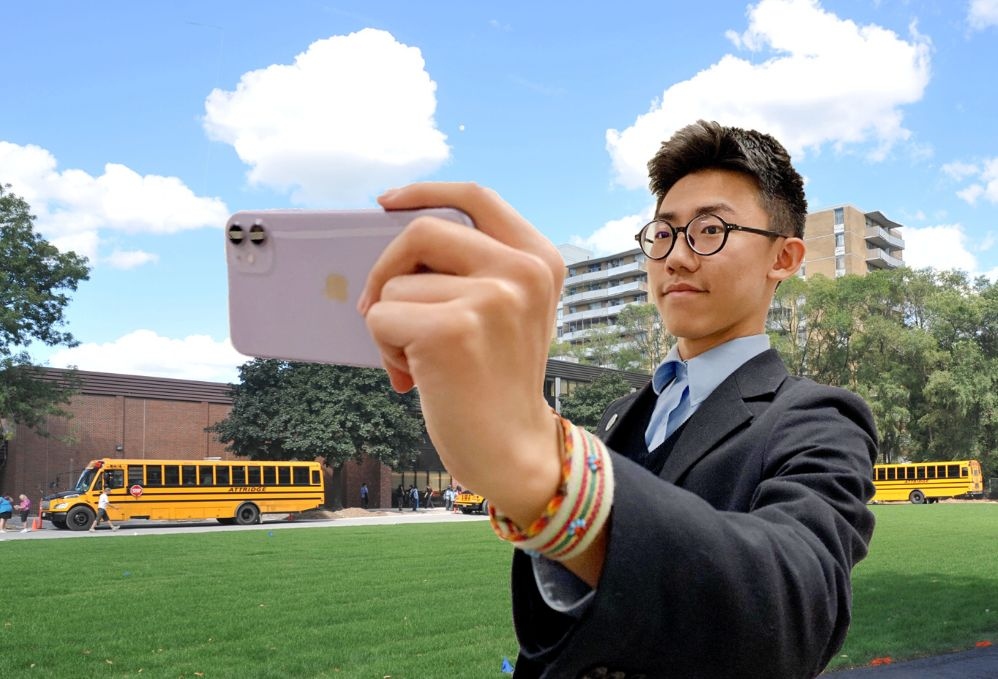Columbia International College is honored to have Jackson Yang as our special guest speaker at the Annual Award Ceremony on April 18.
Jackson is a proud alumnus of CIC, having joined the school as a Grade 10 student and graduating in 2021. Currently, he is a second-year student at Imperial College London, studying Design Engineering.
During his time at CIC, Jackson was actively involved in various clubs and extracurricular activities that helped shape his passion for engineering and design.
Jackson has travelled all the way from the UK to share his journey from CIC to Imperial College London, along with the insights and experiences he gained along the way.
Hi everyone, my name is Kang Yang. I’m currently in my second year studying Design Engineering at Imperial College London. It’s an honor to be back at my alma mater, Columbia International College, as a special guest today.
Before I continue, I’d like to congratulate all of you for your accomplishments. Studying abroad is challenging, and being recognized by the school for your hard work is commendable. I joined CIC in Grade 10 and graduated in 2021. I will complete my master’s degree at Imperial College London in 2025.
My high school courses at CIC laid a solid foundation for my university studies. Beyond academics, I was actively involved in various extracurricular activities at CIC, including the Leadership Team and the Model United Nations team. I even attended the 2019 MUN conference at the United Nations Headquarters.
 I participated in the Duke of Edinburgh Gold Award program, volunteering to build a sewage system for a primary school in Quito, Ecuador. One of my proudest achievements at CIC was starting a second-hand book trading platform with my team, allowing students to buy or sell physical books conveniently and affordably.
I participated in the Duke of Edinburgh Gold Award program, volunteering to build a sewage system for a primary school in Quito, Ecuador. One of my proudest achievements at CIC was starting a second-hand book trading platform with my team, allowing students to buy or sell physical books conveniently and affordably.
University life has been an exciting leap from high school, fostering self-discovery and growth. Design Engineering at Imperial College emphasizes hands-on projects and real-world problems.
In my first year, my team and I developed an anti-theft wireless charging device for international students during the Human-Centered Design Engineering module, learning the importance of understanding user needs. Currently, in the Industrial Design Engineering module, we’re working on a self-balancing, battery-powered walking stick to assist the elderly. Besides academics, I joined the Kendo Club, representing Imperial in UK competitions, and participated in the Enterprise Lab, collaborating with stakeholders and product designers.
What is design engineering? In my perspective, design engineers are all-rounders with a breadth of knowledge across various fields without being experts in any single one. They bridge the gap between traditional engineering and design to create innovative solutions to modern challenges. The iPhone’s success in capturing the market from Nokia, for instance, was due to its focus on addressing users’ real needs, showcasing the essence of design engineering. The wide range of career paths in diverse industries highlights the growing recognition that hardware and software can no longer be separated. Companies increasingly value design engineers for developing integrated, user-centered solutions.
 As I come to the end of my speech, I’d like to offer three pieces of advice for CIC students, based on my experiences:
As I come to the end of my speech, I’d like to offer three pieces of advice for CIC students, based on my experiences:
Explore your interests early: Many of my friends and I are still uncertain about our future career paths at university, so it’s beneficial to explore your interests and passions during high school. Delve into various subjects to find what excites you – the earlier you start, the better prepared you’ll be for the challenges and opportunities ahead.
Get involved in extracurricular activities: CIC offers numerous opportunities beyond academics. Join clubs, sports, and activities to foster personal development, networking, and skill-building. Embrace these experiences, as the future favors well-rounded individuals.
Embrace your uniqueness as international students: While studying and interacting with students from diverse backgrounds, consider what makes you unique and how you can contribute to the learning environment. Embracing your cultural background can enrich your educational journey and unlock new possibilities for growth and success.
In conclusion, I’d like to thank Columbia International College for having me today. As you continue your educational journey, remember to explore your interests, engage in extracurricular activities, and embrace your uniqueness. Doing so will prepare you to face challenges and seize opportunities. I wish you all the best in your future endeavors. Thank you for listening.

